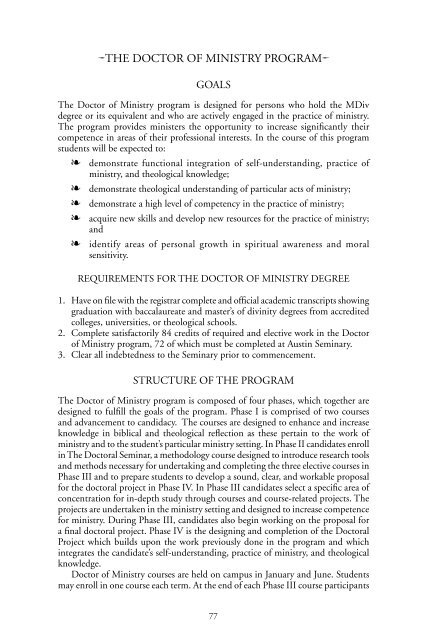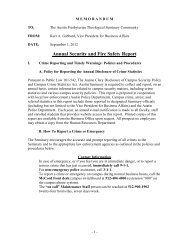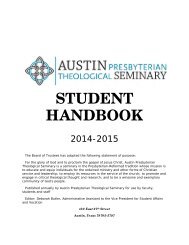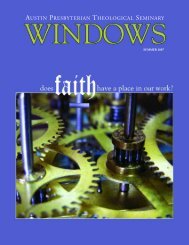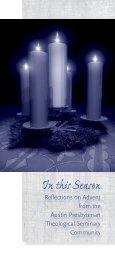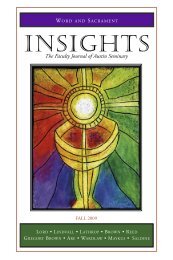Catalogue 2008 Book - Austin Presbyterian Theological Seminary
Catalogue 2008 Book - Austin Presbyterian Theological Seminary
Catalogue 2008 Book - Austin Presbyterian Theological Seminary
You also want an ePaper? Increase the reach of your titles
YUMPU automatically turns print PDFs into web optimized ePapers that Google loves.
�THE DOCTOR OF MINISTRY PROGRAM�<br />
GOALS<br />
The Doctor of Ministry program is designed for persons who hold the MDiv<br />
degree or its equivalent and who are actively engaged in the practice of ministry.<br />
The program provides ministers the opportunity to increase signifi cantly their<br />
competence in areas of their professional interests. In the course of this program<br />
students will be expected to:<br />
� demonstrate functional integration of self-understanding, practice of<br />
ministry, and theological knowledge;<br />
� demonstrate theological understanding of particular acts of ministry;<br />
� demonstrate a high level of competency in the practice of ministry;<br />
� acquire new skills and develop new resources for the practice of ministry;<br />
and<br />
� identify areas of personal growth in spiritual awareness and moral<br />
sensitivity.<br />
REQUIREMENTS FOR THE DOCTOR OF MINISTRY DEGREE<br />
1. Have on fi le with the registrar complete and offi cial academic transcripts showing<br />
graduation with baccalaureate and master’s of divinity degrees from accredited<br />
colleges, universities, or theological schools.<br />
2. Complete satisfactorily 84 credits of required and elective work in the Doctor<br />
of Ministry program, 72 of which must be completed at <strong>Austin</strong> <strong>Seminary</strong>.<br />
3. Clear all indebtedness to the <strong>Seminary</strong> prior to commencement.<br />
STRUCTURE OF THE PROGRAM<br />
The Doctor of Ministry program is composed of four phases, which together are<br />
designed to fulfi ll the goals of the program. Phase I is comprised of two courses<br />
and advancement to candidacy. The courses are designed to enhance and increase<br />
knowledge in biblical and theological refl ection as these pertain to the work of<br />
ministry and to the student’s particular ministry setting. In Phase II candidates enroll<br />
in The Doctoral Seminar, a methodology course designed to introduce research tools<br />
and methods necessary for undertaking and completing the three elective courses in<br />
Phase III and to prepare students to develop a sound, clear, and workable proposal<br />
for the doctoral project in Phase IV. In Phase III candidates select a specifi c area of<br />
concentration for in-depth study through courses and course-related projects. The<br />
projects are undertaken in the ministry setting and designed to increase competence<br />
for ministry. During Phase III, candidates also begin working on the proposal for<br />
a fi nal doctoral project. Phase IV is the designing and completion of the Doctoral<br />
Project which builds upon the work previously done in the program and which<br />
integrates the candidate’s self-understanding, practice of ministry, and theological<br />
knowledge.<br />
Doctor of Ministry courses are held on campus in January and June. Students<br />
may enroll in one course each term. At the end of each Phase III course participants<br />
77


